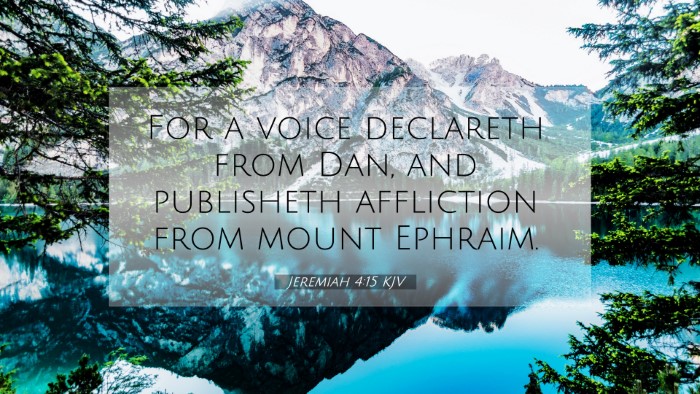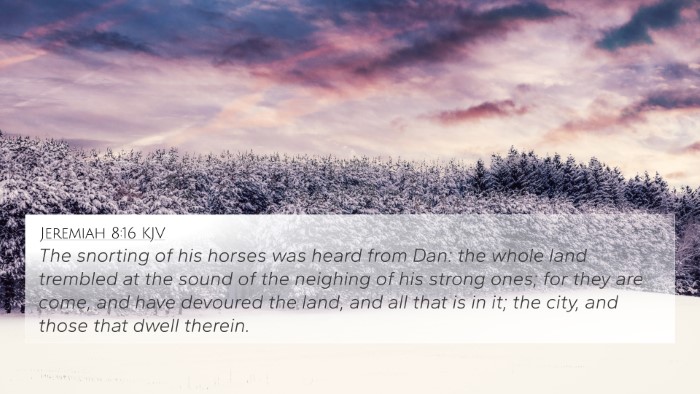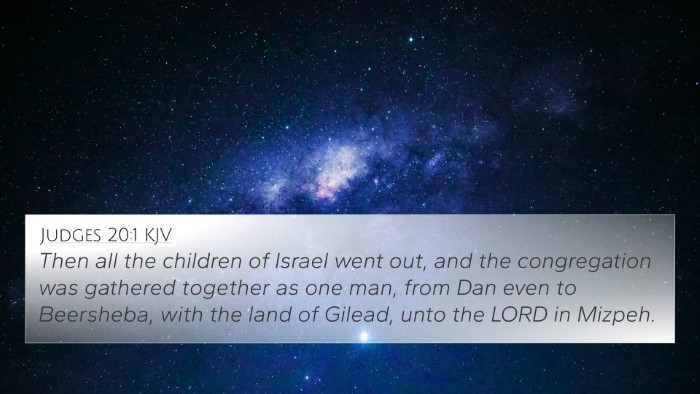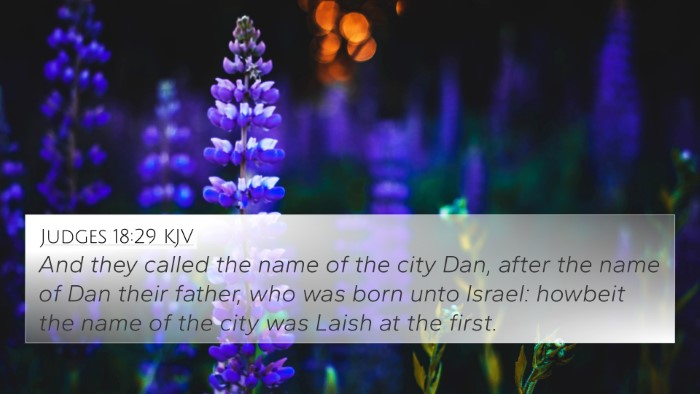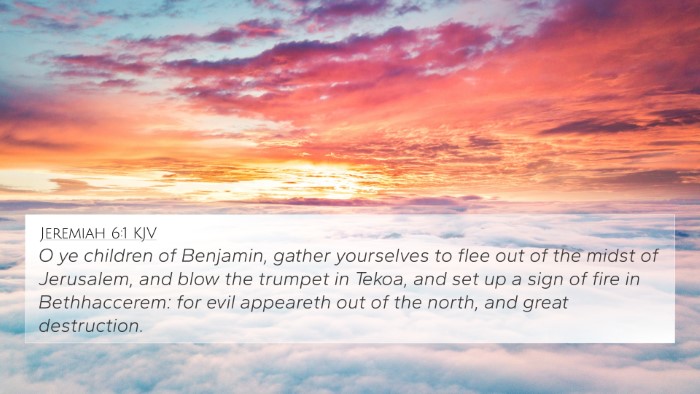Understanding Jeremiah 4:15
Verse Reference: Jeremiah 4:15
In this verse, the prophet Jeremiah speaks about the message arriving from Dan and the proclamation of disaster from the hills of Ephraim. This serves as a warning to Israel about impending judgment due to their wickedness and apostasy. To comprehend this verse effectively, we will analyze it through the insights of various public domain commentaries.
Commentary Insights
-
Matthew Henry:
Henry elaborates that the 'voice' from Dan signifies the news of approaching calamity. Jeremiah uses this geographical reference to illustrate how widespread the warnings of God are. The hills of Ephraim represent not only a physical location but also the moral and spiritual decline happening in Israel. The urgency of the situation is emphasized, highlighting that judgment is not only imminent but also unavoidable.
-
Albert Barnes:
Barnes interprets the 'voice' as a divine call or proclamation, indicating the seriousness of the situation in Israel. The mention of both Dan and Ephraim symbolizes the northern tribes of Israel, pointing out their significant role in the nation's disobedience. He notes that the reference to the hills serves as a metaphor for spiritual destruction, as they were once areas of divine presence now turned into places of calamity.
-
Adam Clarke:
Clarke emphasizes the prophetic nature of the warning given in this verse. He suggests that the 'voice' from Dan alerted the people of impending judgment, and the mention of Ephraim underscores the severity of the message. Clarke argues that the hills are symbolic of high places where idolatry flourished, thereby indicating where Israel's downfall began.
Cross-References for Jeremiah 4:15
To deepen your understanding of Jeremiah 4:15, consider the following biblical cross-references:
- Isaiah 22:5: A reference to the impending destruction and turmoil in Jerusalem.
- Jeremiah 1:14: Similar theme of the north bringing evil against Israel.
- Jeremiah 6:1: Warning to flee from the north and prepare for judgment.
- Hosea 5:8: Proclamation of judgment against Ephraim, paralleling Jeremiah’s message.
- Ezekiel 7:2: The end has come upon the land, a consistent theme of impending doom.
- Amos 3:6: Affirms the principle that a calamity cannot occur without divine warning.
- Micah 1:1: Prophetic announcements from various regions emphasizing impending judgment.
- Zephaniah 1:4: A call for judgment against Jerusalem and its surrounding areas.
- Psalm 46:1: God as refuge in times of trouble, contrasting the chaos of judgment described by Jeremiah.
- Matthew 24:21: Jesus speaks about great tribulation echoing themes of disaster from the Old Testament.
Thematic Connections
This verse illustrates the overarching themes of judgment and divine warning found throughout Scripture. The connections between Bible verses mentioning judgment can be outlined as follows:
- Divine Warning: The pattern of God sending warnings before judgment is consistent across the prophetic books.
- Spiritual Decline: Themes of neglecting faith and falling into idolatry recur in both the Old and New Testament.
- Urgency of Repentance: The call for repentance is a frequent motif linked across prophetic scriptures.
- God's Sovereignty: The sovereignty of God in orchestrating events to fulfill His purposes is a woven theme throughout these texts.
Tools for Bible Cross-Referencing
To explore further into the cross-referenced relationships of biblical verses, several resources are available:
- Bible Concordance: A comprehensive listing of biblical words and their occurrences for thorough study.
- Bible Cross-Reference Guide: Enables users to find connections and parallels within Scripture.
- Cross-reference Bible Study: Methods that focus on linking verses with broader themes and teachings.
- Bible Chain References: Systems that guide readers through interconnected verses for deeper understanding.
- Resource for Identifying Connections: Utilizing software or literature on biblical studies to systematically analyze connections between Old and New Testament passages.
Conclusion
Jeremiah 4:15 serves as a powerful reminder of the consequences of straying from God. By examining the verse through the lens of various commentaries and understanding its interconnectedness with other scripture, believers can draw profound insights about God’s nature, the importance of heeding divine warnings, and the inevitable outcomes of disobedience. This synthesis not only enriches personal study but also aids in developing a thematic understanding of God’s message throughout the Bible.


